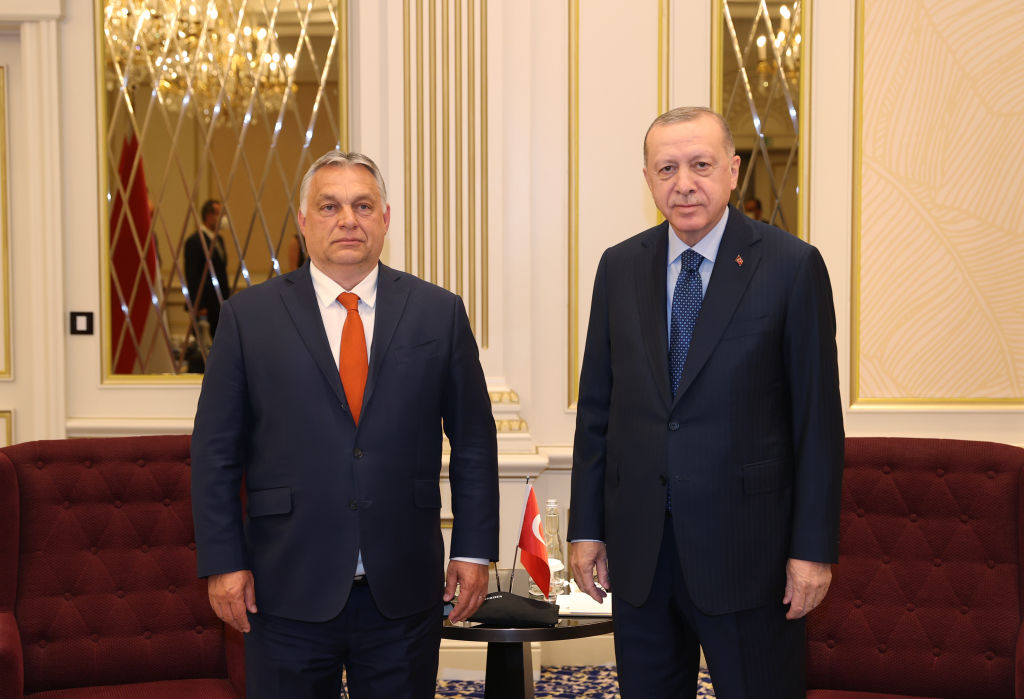Finland is voting to join NATO, but Hungary is joining Turkey as an obstacle


A free daily email with the biggest news stories of the day – and the best features from TheWeek.com
You are now subscribed
Your newsletter sign-up was successful
Finland's parliament on Tuesday started debating legislation to finalize the country's bid to join NATO, and lawmakers are expected to approve the bill on Wednesday. After the legislation passes, President Sauli Niinisto will have about three months to sign it, preferably alongside Sweden, and send Finland's instruments of NATO accession to Washington, AFP reports. Finland would then be part of the Western military alliance as soon as all 30 member states ratify its membership, as 28 countries have already done. Only Turkey and Hungary have held off.
Turkey has threatened to block Sweden's accession over Stockholm's perceived tolerance of Kurdish groups Ankara calls terrorists. But Turkish Foreign Minister Mevlut Cavusoglu reiterated Monday that Finland will likely get its vote, and probably before Ankara works out its differences with Sweden. Sweden and Finland would prefer to join NATO at the same time, but Finland's vote on Wednesday is an acknowledgment that it may accede separately if Sweden runs into roadblocks.
That leaves Hungary.
The Week
Escape your echo chamber. Get the facts behind the news, plus analysis from multiple perspectives.

Sign up for The Week's Free Newsletters
From our morning news briefing to a weekly Good News Newsletter, get the best of The Week delivered directly to your inbox.
From our morning news briefing to a weekly Good News Newsletter, get the best of The Week delivered directly to your inbox.
Hungary's parliament is starting debate Wednesday on approving both countries' bids to join NATO, but the final vote isn't expected until the second half of March — and there's no guarantee it will go in Finland or Sweden's favor. "While NATO members are more concerned about the potential of Turkey to stonewall accession for the Nordic countries," Politico reports, "the government of Viktor Orbán has also been dragging its heels on parliamentary approval" and "there are signs of trouble ahead."
Orbán, whose Fidez party controls Hungary's parliament and other levers of power, said last Friday that "while we support Sweden and Finland's accession to NATO in principle, we first need to have some serious discussions." Specifically, he pointed at previous criticism from Sweden and Finland on Hungary's veer toward authoritarianism and away from representative democracy. "How, this argument runs, can anyone want to be our ally in a military system while they're shamelessly spreading lies about Hungary?" Orbán asked.
"Orbán's comments have confirmed fears in Brussels that the Hungarian leader could try to use his leverage over NATO enlargement to extract concessions on rule-of-law issues," Politico reports.
Finland, which shares a 832-mile border with Russia, the longest in the European Union, is eager to finalize NATO membership and plans to do so before April 2 national elections.
A free daily email with the biggest news stories of the day – and the best features from TheWeek.com
Peter has worked as a news and culture writer and editor at The Week since the site's launch in 2008. He covers politics, world affairs, religion and cultural currents. His journalism career began as a copy editor at a financial newswire and has included editorial positions at The New York Times Magazine, Facts on File, and Oregon State University.
-
 The broken water companies failing England and Wales
The broken water companies failing England and WalesExplainer With rising bills, deteriorating river health and a lack of investment, regulators face an uphill battle to stabilise the industry
-
 A thrilling foodie city in northern Japan
A thrilling foodie city in northern JapanThe Week Recommends The food scene here is ‘unspoilt’ and ‘fun’
-
 Are AI bots conspiring against us?
Are AI bots conspiring against us?Talking Point Moltbook, the AI social network where humans are banned, may be the tip of the iceberg
-
 Judge blocks Hegseth from punishing Kelly over video
Judge blocks Hegseth from punishing Kelly over videoSpeed Read Defense Secretary Pete Hegseth pushed for the senator to be demoted over a video in which he reminds military officials they should refuse illegal orders
-
 Trump’s EPA kills legal basis for federal climate policy
Trump’s EPA kills legal basis for federal climate policySpeed Read The government’s authority to regulate several planet-warming pollutants has been repealed
-
 House votes to end Trump’s Canada tariffs
House votes to end Trump’s Canada tariffsSpeed Read Six Republicans joined with Democrats to repeal the president’s tariffs
-
 Bondi, Democrats clash over Epstein in hearing
Bondi, Democrats clash over Epstein in hearingSpeed Read Attorney General Pam Bondi ignored survivors of convicted sex offender Jeffrey Epstein and demanded that Democrats apologize to Trump
-
 El Paso airspace closure tied to FAA-Pentagon standoff
El Paso airspace closure tied to FAA-Pentagon standoffSpeed Read The closure in the Texas border city stemmed from disagreements between the Federal Aviation Administration and Pentagon officials over drone-related tests
-
 Judge blocks Trump suit for Michigan voter rolls
Judge blocks Trump suit for Michigan voter rollsSpeed Read A Trump-appointed federal judge rejected the administration’s demand for voters’ personal data
-
 US to send 200 troops to Nigeria to train army
US to send 200 troops to Nigeria to train armySpeed Read Trump has accused the West African government of failing to protect Christians from terrorist attacks
-
 Grand jury rejects charging 6 Democrats for ‘orders’ video
Grand jury rejects charging 6 Democrats for ‘orders’ videoSpeed Read The jury refused to indict Democratic lawmakers for a video in which they urged military members to resist illegal orders
